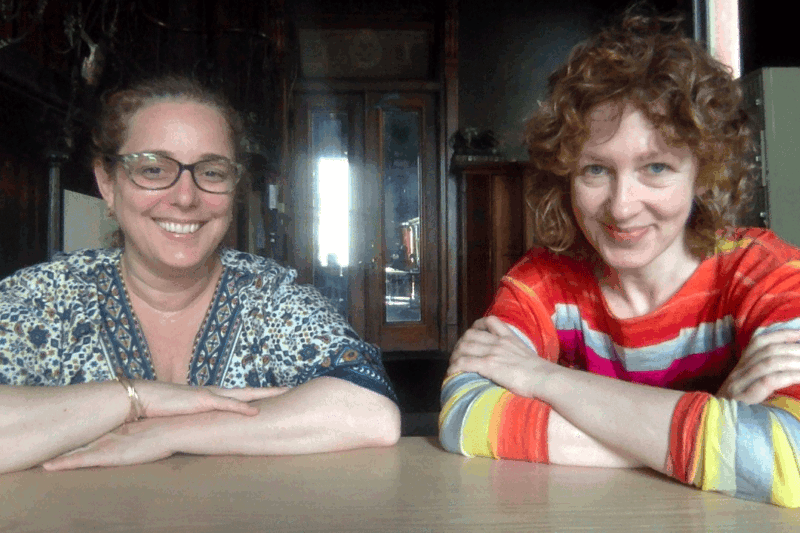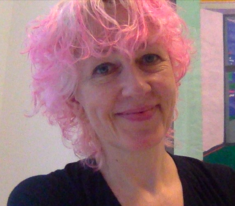This event will take place online via Zoom. Please register below to access the link.
Thank you for registering for 'Blurring the Lines Between Art and Activism'. The conversation between Tania Brugera, Claire Bishop and Irene Small addressed the new book, Tania Bruguera in conversation with / en conversación con Claire Bishop. through an exchange of different views on aspects of Brugera's art. They worked through differences between action and gesture, how to navigate unexpected co-production of artwork with a state apparatus, and reflections on the artist's responsibility to the audience when the artwork involves danger to the artist. Questions from the audience were incredibly timely, and the participants offered thoughts on how artists respond to dictatorships and what we in the USA can learn from international examples.
This event was recorded and a link to the video for those who missed the event or wish to watch it again can view it here .
A controversial figure working in installation and performance, Cuban artist Tania Bruguera (born 1968) has consistently blurred the lines between art and activism. Defining herself as an initiator rather than an author, she often invites spectator participation and works in a collaborative mode, working with various organizations, institutions and individuals to challenge political and economic power structures and the control they hold over society.
This panel discussion will look at different aspects of Bruguera’s career including her exploration of the ways in which art can be applied to everyday life, and how its effects can translate into political action. Panelists will explore topics covered in this eleventh title in the Fundación Cisneros' Conversaciones/Conversations series, which delves into terms Bruguera has developed and or adapted over the last decade to “illuminate” her work–Arte de Conducta (Behaviour Art), Political Timing Specific Art, Arte Útil (Useful Art), Est -Ética (Aest-ethics) and Artivism. Bruguera’s story, as discussed with Bishop over several years, runs from the development of her early work in 1980s Cuba, motivated by her political activism, and her shift from intimate performances to the orchestration of the large-scale interactive situations and events that characterize her work today. The panel will also delve into Bruguera’s current work as she has said that this publication is closing a chapter in her life. “I sometimes feel I am carrying those works that belong to the past around too much. From now on, those that want to know about them, will have to read the book […] I am at that point in time where I want to look to the future.”
For more information about the publication please visit: https://bit.ly/30jaoJn
This online conversation will be in English. Video documentation as well as a Spanish language transcript will be made available on the sponsoring institutions' websites at a later date.
Speaker Bios:
Tania Bruguera is a Cuban installation and performance artist and activist. She lives and works between New York and Havana, has participated in numerous international exhibitions and her work is in the permanent collections of many institutions, including the Museum of Modern Art, New York, the Bronx Museum of the Arts and the Museo Nacional de Bellas Artes de La Habana. As a result of her art actions and activism, Bruguera has been arrested and jailed several times, including this year for speaking out against police brutality in Cuba.
Claire Bishop is a critic and professor in the PhD Program in Art History at the Graduate Center, City University of New York. Her books include Installation Art: A Critical History (2005) and Artificial Hells: Participatory Art and the Politics of Spectatorship (2012), for which she won the 2013 Frank Jewett Mather award, and Radical Museology, or, What’s Contemporary in Museums of Contemporary Art? (2013). She is a contributing editor to Artforum, and her essays and books have been translated into eighteen languages. She met Tania Bruguera for the first time in 2007, when she went to Havana to teach at Cátedra de Arte de Conducta.
Irene V. Small is Associate Professor of Contemporary Art & Criticism in the Department of Art & Archaeology at Princeton University. She is also an associated faculty member of the Programs in Media & Modernity and Latin American Studies, and is currently a Behrman Fellow at The Humanities Council at Princeton. She is the author of Hélio Oiticica: Folding the Frame (University of Chicago Press, 2016), and is currently at work on a new book that takes as its point of departure Lygia Clark’s notion of “the organic line.”
About the Colección Patricia Phelps de Cisneros:
The Colección Patricia Phelps de Cisneros (CPPC) was founded in the 1970s by Patricia Phelps de Cisneros and Gustavo A. Cisneros and is one of the core cultural and educational initiatives of the Fundación Cisneros. Based in New York City and Caracas, the CPPC’s mission is to promote scholarship and enhance appreciation of the diversity, sophistication, and range of art from Latin America. The CPPC achieves these goals through the preservation, presentation, and study of the material culture of the Ibero-American world—ranging from the ethnographic to the contemporary. The CPPC’s activities include exhibitions, public programs, publications, grants for scholarly research and artistic production. The CPPC’s website is a platform for art and ideas from Latin America and a forum for critical debate on the issues of the moment.
Co-hosted by the Colección Patricia Phelps de Cisneros and The James Gallery/The Center for the Humanities at The Graduate Center, CUNY, and thanks to the Ph.D. Program in Art History.


